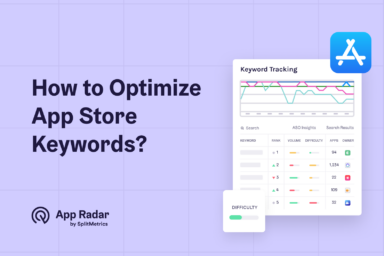App Store Keywords: How to Use iOS Keyword Field to Boost Your ASO
The keyword field is a unique tool for managing organic rankings on the App Store that should be used by all apps. It’s vital for ASO because it directly impacts an app's discoverability and visibility.
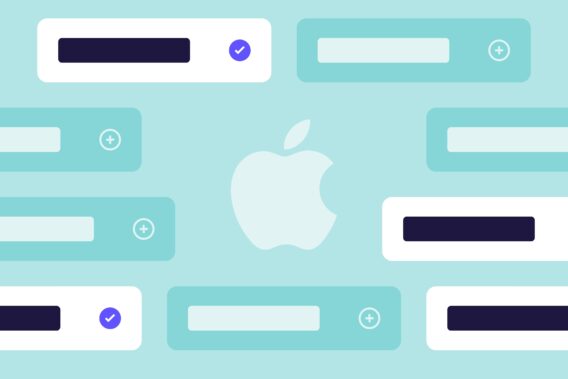
All app developers should fully understand and take advantage of the keyword field feature to develop a successful app store optimization strategy for the App Store. This article summarizes all technical requirements for the keyword field and provides best practices that will enhance visibility and discoverability on the App Store.
What is the keyword field in App Store Connect?
The iOS keyword field in App Store Connect is a section where app developers can input relevant keywords or phrases that describe their app that they want to rank organically. These keywords help the App Store’s search algorithm understand the nature and purpose of the app, improving its discoverability when users search for related terms. It’s a crucial component of any ASO strategy on iOS.

How do keywords placed in the keyword field work for your app?
Keywords put in the keyword field impact the discoverability of the app in the App Store organic search results. The keyword field is defined as a crucial ranking factor along with the app’s name (title), subtitle (a short promotional description), primary category, and factors related to user behavior, like downloads and the quantity and quality of user ratings and reviews – both in the official developer resources for the App Store and all ASO practitioners.
TIP: Read our article App store ranking factors: App Store vs. Google Play for a quick overview of all ranking factors relevant to both main app marketplaces.
Why is the keyword field important for iOS apps and ASO?
According to data shared by Apple Search Ads, 70% of App Store visitors use search to discover apps. As a result, app store optimization and keywords are crucial to getting an app discovered by new users in the App Store.
When it comes to organic rankings, the keyword field has less weight than the app name or subtitle, but the right distribution of keywords between them is crucial for maximizing their effectiveness, as each has a different purpose.
The keyword field offers all developers 100 characters to specify terms or phrases that their app should show up for in search results. Its main strength is its versatility: this is the place where the most important generic keywords related to functionality will be placed.
Dive Deeper:
The ultimate guide to Apple App Store ASO for app marketers
App Name: Writing iOS App Names that Drive Downloads
App Keywords: How to Choose the Best Keywords for Your App
What are the rules for adding keywords to the keyword field?
Technicalities come first, so let’s have them out of the way. Rules defined by the official iOS developer guidelines are simple:
- No more than 100 alphanumeric characters: this excludes commas used as separators. This is the only rule enforced by the system. All the others are not, which is due to a variety of reasons. It’s up to you to make sure you follow them.
- No spaces: Keywords should be separated by commas, with no spaces between them. These do use up the character limit but may be unavoidable in case of longer keywords (“real estate, puzzle games, photo editor” etc.), so best save them for such situations.
- No repeated words: Avoid repeating keywords within the field. There’s no real benefit in keyword stuffing and it might get you in trouble, as Apple may take necessary steps to prevent abuse of the system.
- No special characters: Do not use special characters or punctuation marks, unless necessary, as they aren’t relevant to search queries, save perhaps for those rare instances when they’re part of a brand. Given that your focus in the keyword field will most probably be on keywords related to functionality, it’s better to avoid special characters altogether.
- No brand names and trademarks: Don’t use trademarked terms or brand names not directly related to your app. This means developer and app names and so on. Abusing this rule will trigger a necessary reaction from Apple.
- No misspellings: Ensure correct spelling of all keywords to maximize search effectiveness. This is simply in your own best interest. Don’t waste precious character limits on keywords that won’t work in any way for you.
TIP: Some developers add misspelled keywords on purpose for a simple reason – people sometimes use them. However, the App Store algorithm is constantly being improved to recognize misspellings.
- No plurals: it isn’t necessary to write the same word in the plural and singular. Remember that we are dealing with a sophisticated algorithm, so, if you want to rank for course and courses, “course” will be enough to rank in both.
Good to know little hacks:
- If you are using numbers, write the digit. The algorithm will know that “3” and “three” are the same. This will leave you more characters for further keywords.
- Additionally, some terms are a free match for apps, so don’t waste your space on them. For example, the word “app” and the name of the category are automatically indexed. So you do not need to use them as your keywords!
Optimizing for app keywords in App Store is a big topic – as an app marketer, you might find valuable our article on Google Play keywords optimization as well
How to Avoid Duplicates in Your Keywords?
This one can be tricky, as there’s a common mistake that leads to duplication: when adding long-tail or combination keywords, many app developers often put the whole phrase into the keyword field. However, the system only needs a keyword to be present in your app information once to index it.
Our advice is to always use single words. The algorithm will automatically make combinations for you. By only using single keywords, you maximize your chance of ranking for a series of combinations. Take a look at this example:
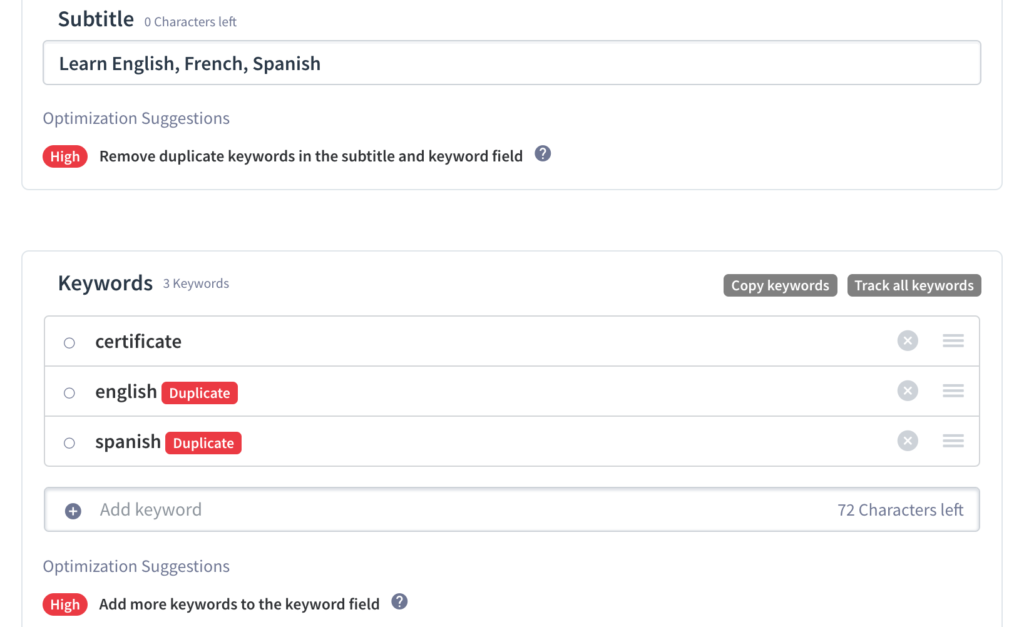
Additionally, look beyond the keyword field. Don’t insert your brand in it, as it’s already in the title of the app.
TIP: App Radar will tell you if you have any duplicate keywords in your app store listing and help you follow all the other rules for the keyword field.
What are the best practices for pushing your App Store keywords?
Prioritize relevance and user intent
Do not randomly choose your keywords or only include trending ones. For the App Store to rank your app, your keywords have to be relevant. That means they have to relate to your app, its functionalities, and features.
Attracting irrelevant traffic will have serious consequences. Users who are not part of your target audience most likely will not engage with your app’s product page, leading to drops in rankings, due to the importance of behavioral parameters to the search algorithm.
Misled users might engage with your product page in some cases but will end up quickly uninstalling your app or will simply stop using it. This will also hurt your App Store rankings.
Optimize for impressions, but remember about the competition
Your end goal is to rank as high as possible for popular keywords with the potential of driving a high volume of relevant traffic to your app’s product page. For many of them, this might be extremely difficult, due to competition. In practice, you may need to carefully balance these two parameters: competition level and popularity (expressed through the number of performed search queries by users).
Run a competitive analysis
Analyze keywords used by competitors and consider incorporating relevant ones that align with your app. Given the constraints of the keyword field, the priorities of your competitors are a key insight in selecting the right ones for it.
TIP: From AI Review Summaries to Download trends, App Radar offers plenty of means of investigating your competitors on both the App Store and Google Play. Learn more about the Market Intelligence features of App Radar.
Localize & take advantage of shared keyword fields
Some markets on the App Store share the keyword field, particularly those with the same language. For example, apps targeting English-speaking users may share the same keyword field across regions like the United States, Canada, and the United Kingdom. However, it’s important to note that localization may require adjustments to cater to specific regional preferences and search behaviors.
Monitor and regularly update your iOS keywords
The most reliable way to find out what works for your app and what doesn’t is testing. Thus you should be quick and agile in optimizing your app information.
TIP: App Radar allows you to edit the keyword field directly from within the platform, giving you the advantage of all its automatic suggestions and tips on the way. Learn more about ASO Workflow
Regularly check your keyword rankings. When there are keywords in your iOS keyword field, for which your ranking hasn’t improved for quite some time, exchange them with another term or synonym.
TIP: How to upgrade the keyword field to reflect seasonality? Find out by reading this article on our blog: Leveraging Seasonality for More App Downloads.
How to find and choose keywords for iOS app optimization?
Where to find keywords for the keyword field?
A robust keyword pool is built through a semantic analysis of your app’s functionality, careful study of competitors, and actual search queries performed by App Store users.
In practice, you need to confront your assumptions on what words describe your app’s functionality best, versus what people look for through the Search feature on the App Store. All in the context of what your competitors are doing – to learn from their success, and mistakes and to find undiscovered opportunities.
Your direct goal is to find simple, generic keywords with high potential (impression volume) and if possible – a low competition level that represents the functionality of your app as precisely as possible.
The only reasonable advice we can give here is that all keywords in this field should be selected on strict criteria, taking into account their fundamental metrics: relevance score and impression volume.
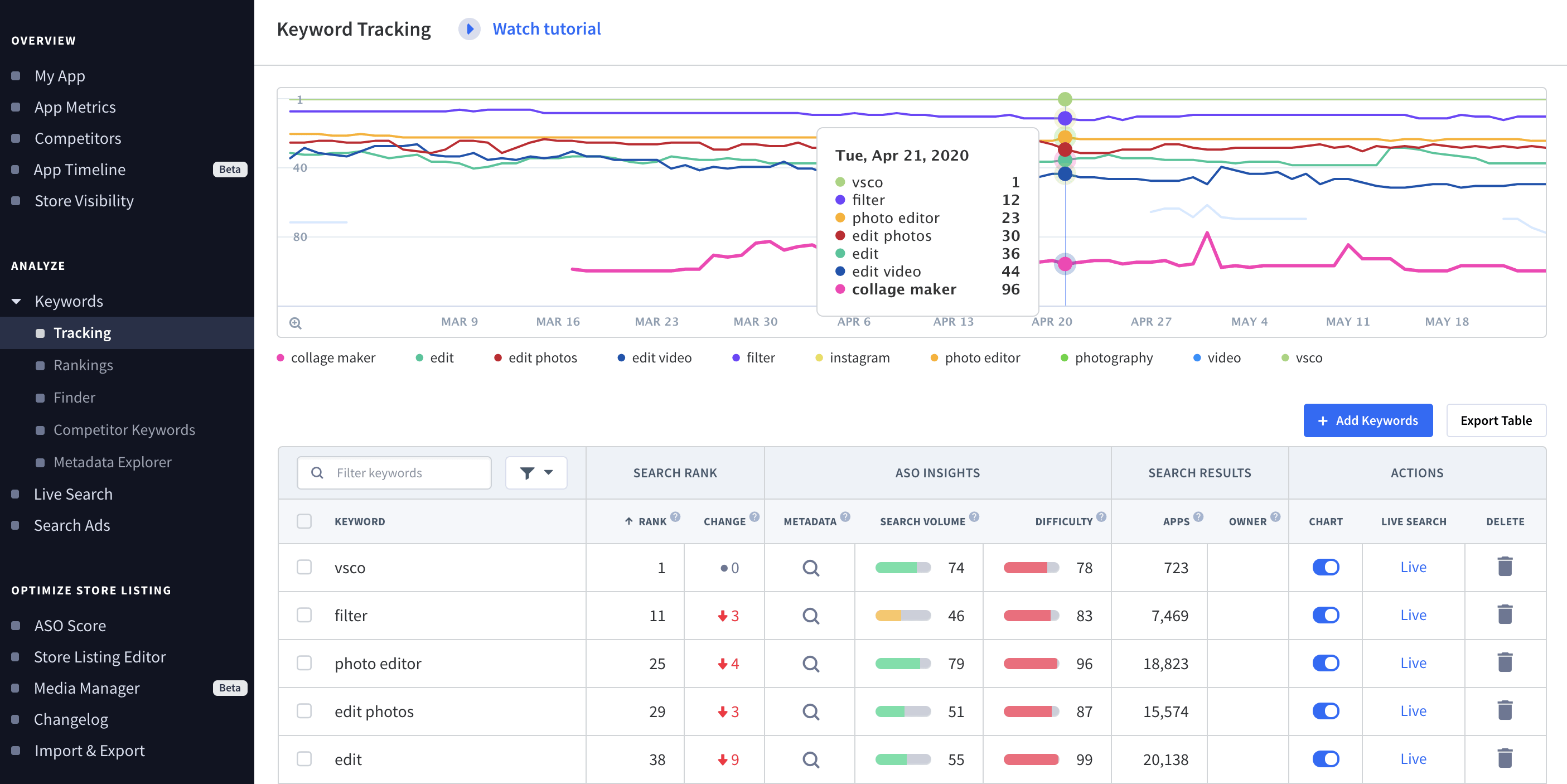
Any sources of keywords that you might have, for example, your App Store reviews – should be confronted with these parameters. This won’t be possible without proper tools.
You can use App Radar for reliable keyword research. App Radar gives you AI recommendations, and you can also get keyword inspiration straight from your competitors’ rankings.
Dive Deeper:
App Screenshots: Designing Compelling Screenshots for the App Store
How to Get Featured in the App Store
Common App Store Optimization (ASO) Myths, Challenged
How to properly distribute search terms across the keyword field, title, and subtitle?
The keyword field is one of the three fields crucial for the ranking algorithm, along with the title (app’s name) and subtitle (short, promotional text). It’s important to understand its purpose in this context, to avoid duplication, and to take the most advantage of these tools.
Considering the app name and app subtitle have a greater influence on search rankings than the iOS keyword field does, you should put the most promising keywords in your app name and subtitle field. In most cases, the app’s title will be your brand only, but just as many times that’s not the case. For example:

The keyword field is the place for top-tier generic keywords related to functionality. Should you use such a keyword in your title, don’t duplicate it here. This way you can ensure, your app is indexed for various keyword combinations and search phrases.
The good news is that the algorithm combines keywords from your app name, subtitle, and keyword field. So if you have a language learning app and want to rank for “language learning”, “online English course”, and “learn Spanish”, your app information may look a little something like this.

How often should I update my iOS keywords?
Apple’s keyword ranking algorithm is constantly improving. At the same time, new competitors or other apps using the same keywords may appear. That means that your keyword rankings aren’t forever, you have to keep regularly optimizing your app information and this includes the App Store Connect keyword field (by the way, we have an in-depth guide on how to use App Store Connect for ASO.
As we mentioned, it’s important to keep track of seasonality, because during many popular holidays, new relevant keywords may gain prominence. So the best answer to this question is:
Keep an eye on your results constantly and update your keyword field as frequently as you need to.
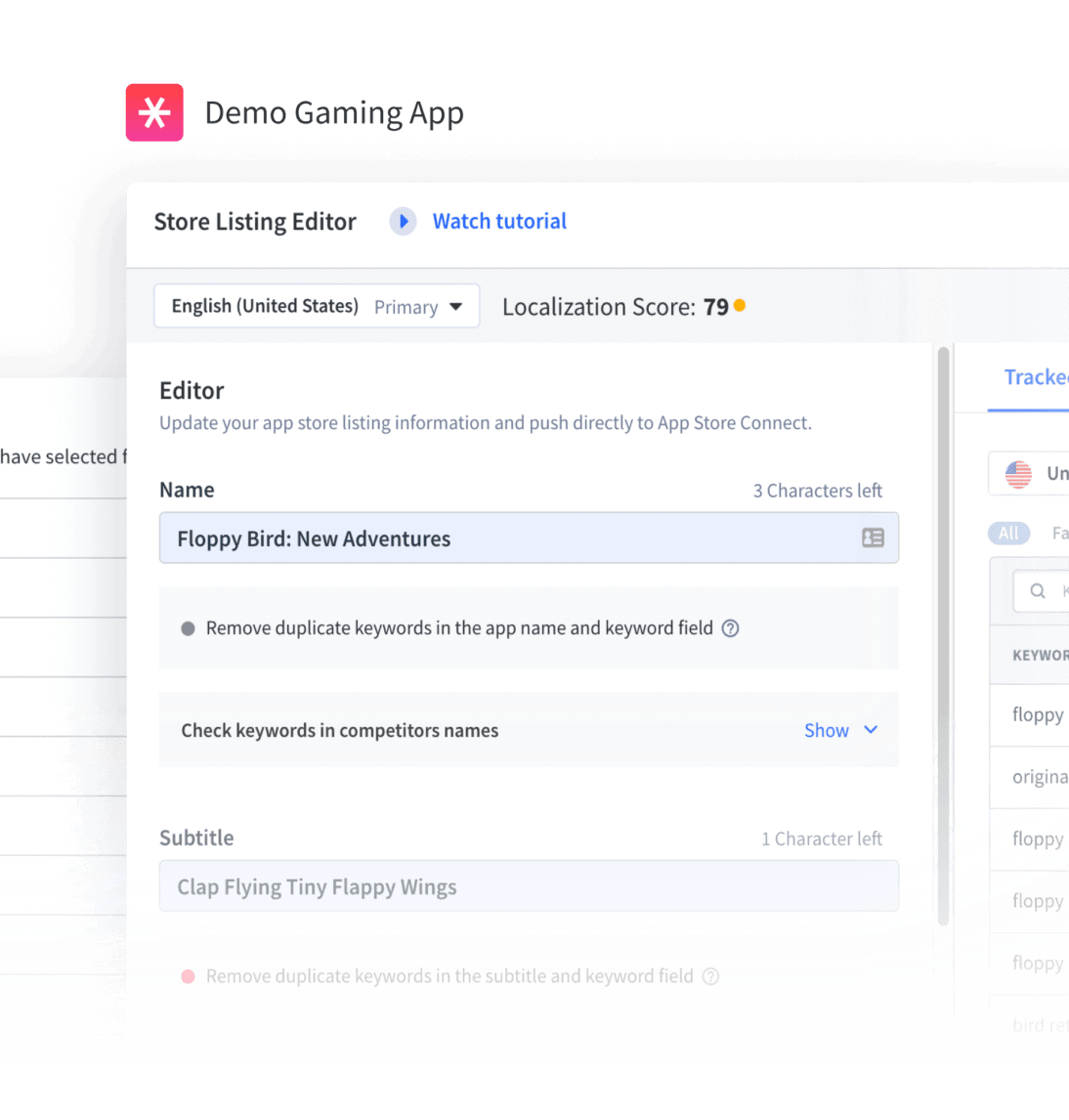
Latest Posts
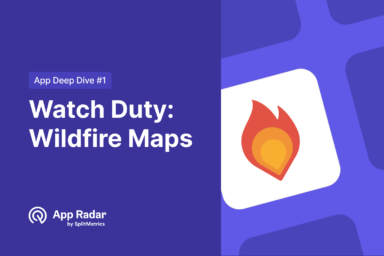
How Watch Duty Became the #1 Wildfire Tracking App on the App Store
Check Out App Radar’s Expanded Rankings & Improved Keyword Data Quality!
Unlock App Performance Data with App Radar's API
Try Our Redesigned, AI-Driven Keyword Research & Monitoring Tools for Faster and Easier Workflows!
Academy Lessons
Continue lessons
